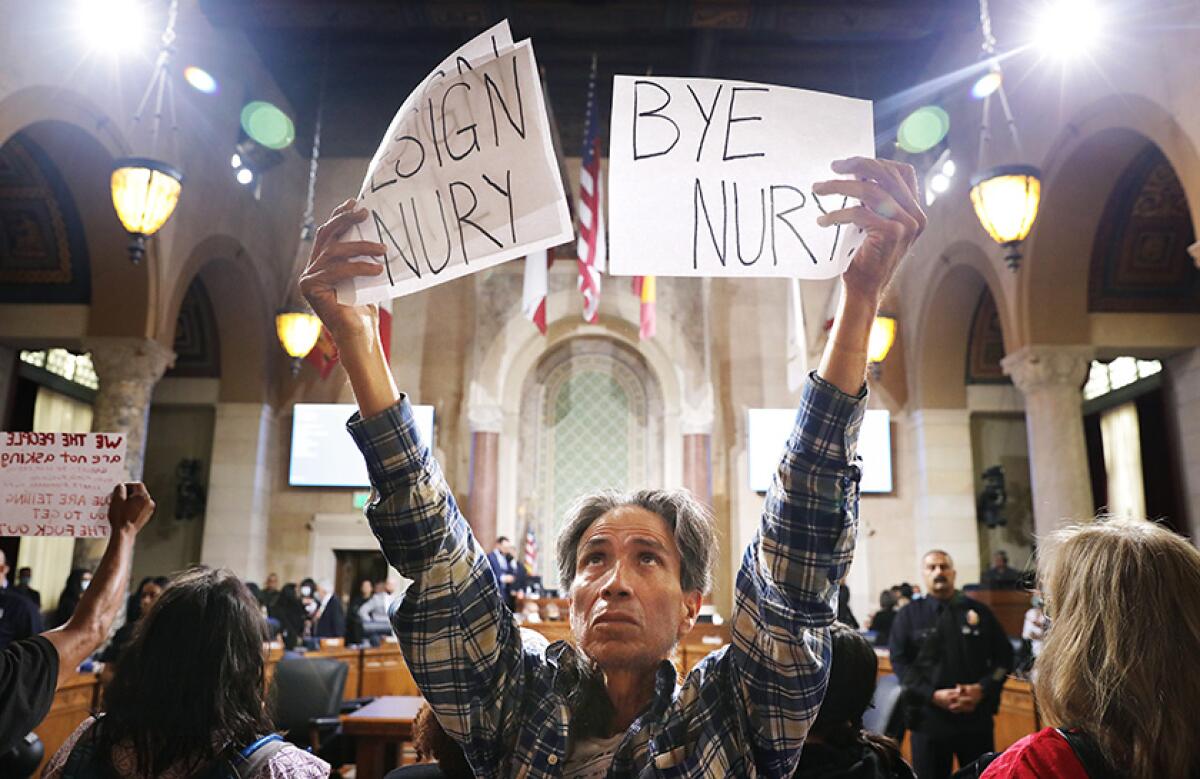Not a ‘power grab.’ State lawmakers can help keep L.A. on the path of meaningful reform

- Share via
Can members of the Los Angeles City Council be trusted to ignore their own political interests and hand over power to an independent redistricting commission?
Perhaps. With the cloud of scandal still hanging over City Hall and overwhelming public support for an independent commission that would draw City Council and school board district boundaries without political interference, city leaders are under pressure to put good government policy over personal agendas.
But a bill being carried by Sen. María Elena Durazo (D-Los Angeles) is a valuable backstop if the City Council can’t — or won’t — fully relinquish power. Senate Bill 52 would establish an independent citizen redistricting commission for the city, modeled on L.A. County’s and California’s independent commissions.
Fixing City Hall
Los Angeles City Hall has been rocked by scandal after scandal, but now there’s momentum to reform city government.
Replacing L.A.’s politically tainted redistricting process was a good idea even before a recording caught then-Council President Nury Martinez, former Councilmember Gil Cedillo and current Councilmember Kevin de León scheming to draw district lines to help themselves and hurt their foes. But calls to enact truly independent redistricting have been ignored in City Hall for decades, which is why Durazo began looking at a bill to impose it shortly after the leaked audio scandal.
There is precedent for this kind of pressure. The Legislature passed a bill in 2016 requiring L.A. County to enact an independent commission — though there is legal debate over whether the state can force the same change on a charter city like L.A. that has more independence.
Durazo’s bill has problematic details, such as calling for 24 commissioners, which is nearly double the number on the county and state panels. A commission of two dozen people is just too large and unwieldy. But SB 52 is a first draft, and Durazo’s office said they’re working on amendments and consulting redistricting experts, including UC Berkeley Law School Dean Erwin Chemerinsky, who helped draft L.A.’s last charter update in 1999.
So it was a bit premature when, last week, Council President Paul Krekorian came out in strong opposition to SB 52. His office called it a “power grab by the state Legislature.” On Monday, the council’s Ad Hoc Committee on City Governance Reform unanimously voted to have the city officially oppose the bill.
With political appointees drawing City Council districts, rather than a truly independent panel, the process is fraught with gamesmanship and suspicion.
Krekorian’s argument is that the City Council is already evaluating options for creating an independent redistricting commission with public participation, and Los Angeles voters “deserve to decide the terms of their own redistricting process.” That’s true. A bill passed by the Legislature and signed by the governor would bypass meaningful public input and a local vote.
There is real momentum for change within Los Angeles. Community groups are organizing for major governance reform, including expanding the City Council to improve representation and giving the Ethics Commission more independence. A group of academic leaders that includes Pat Brown Institute Executive Director Raphael Sonenshein, who also helped write the 1999 charter update, is working on its own set of recommendations. There is time to develop a well-rounded reform package for the ballot in 2024.
However, despite the pledges by Krekorian and other council members, there’s no guarantee the City Council will end up putting an independent redistricting charter amendment on the ballot. And even if it does, there’s no guarantee that the council’s proposal will be the right or best version. There are plenty of examples of city leaders writing bad or self-serving charter amendments in the name of governance reform.
Besides, the City Council shouldn’t be tinkering too much with the structure and rules of a commission. “There is a really well established and very successful model of independent redistricting,” said Jonathan Mehta Stein, executive director of California Common Cause, which is following L.A.’s process. “If they mess with that, they’re going to lose the trust of voters.”
Are we being pessimistic? Perhaps. But independent redistricting is such an overdue and important reform of L.A. city government that we’d prefer to hope for the best and prepare for the worst — and have SB 52 ready just in case.
More to Read
A cure for the common opinion
Get thought-provoking perspectives with our weekly newsletter.
You may occasionally receive promotional content from the Los Angeles Times.











